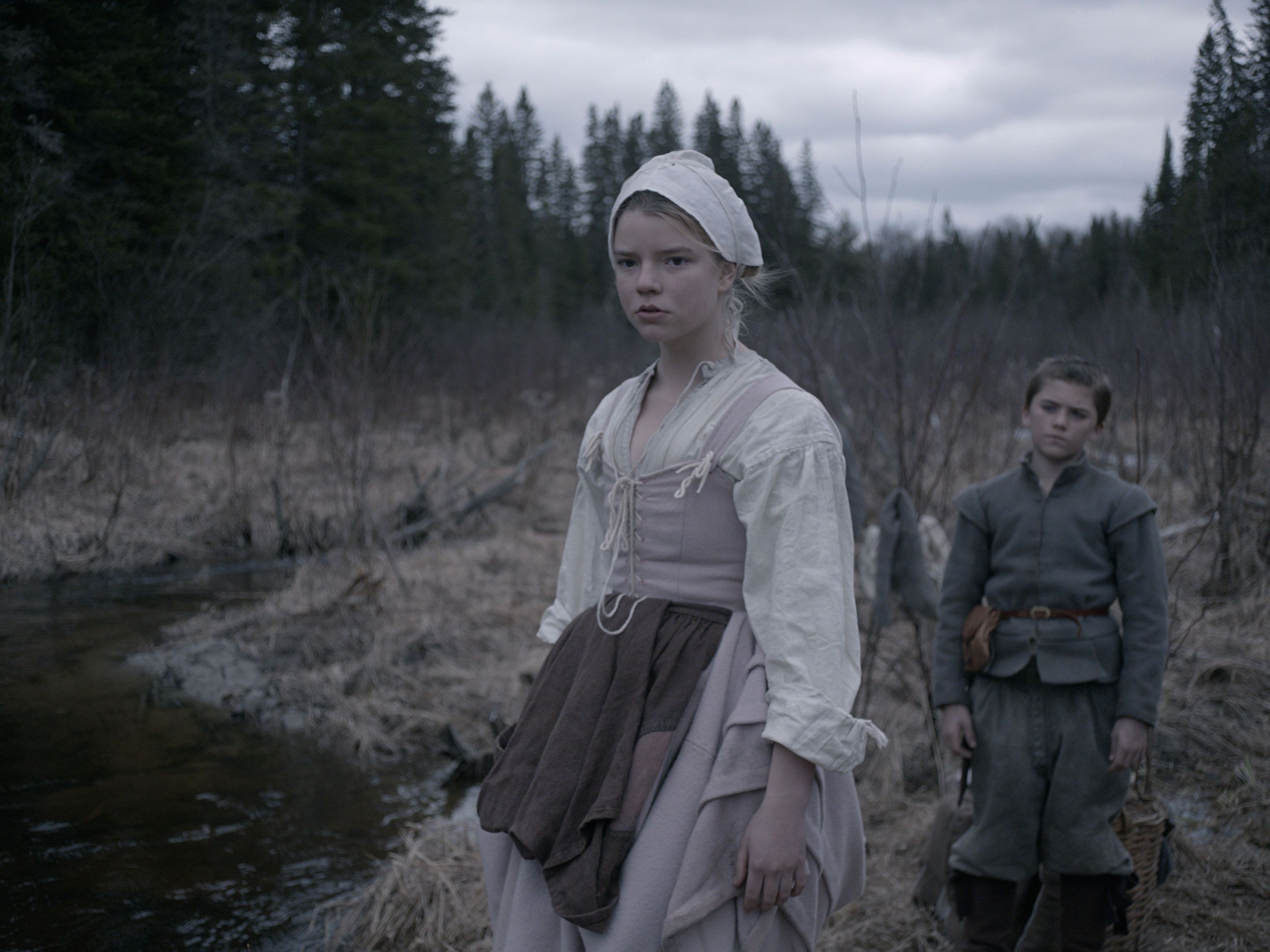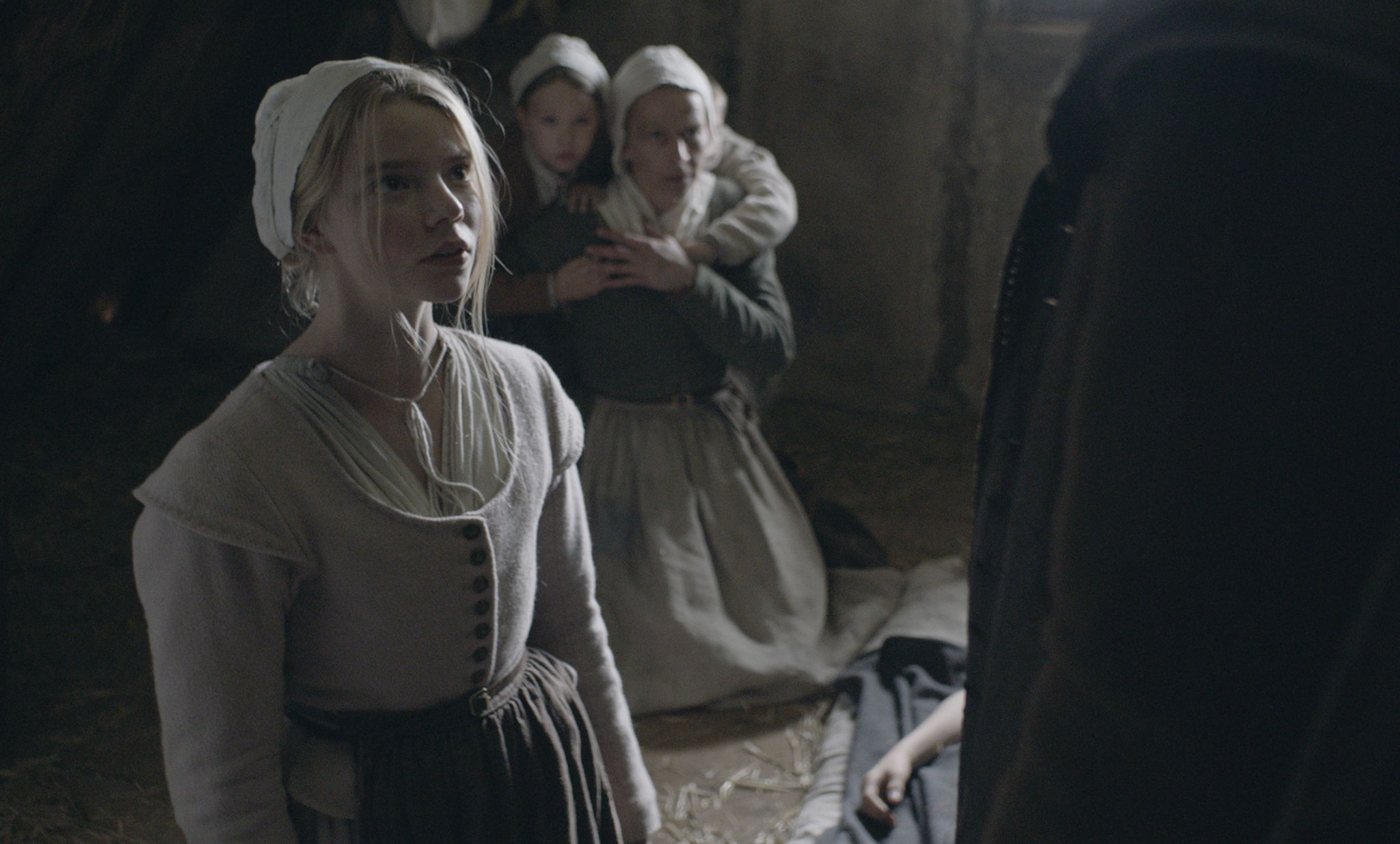Smart Writing and Great Acting Casts a Spell in The VVitch
Film: The VVitch (2015). Young Actress: Anya Taylor-Joy, age 18.
Horror movies featuring a young actress in a "child in peril" role are a dime a dozen, but you've probably never seen one quite like The Witch. The plot concerns a Puritan family living in New England during the 1600's; the film begins as the family is banished from their village for the father William's (Ralph Ineson) sin of "prideful conceit." They start a new life in the wilderness, settling a farm where the mother Katherine (Kate Dickie) gives birth to her fifth child. The four older children are Thomasin (Anya), about age 15; Caleb (Harvey Scrimshaw), about 12; and twins Jonas and Mercy, about 8.

Thomasin and Caleb
One day, Samuel, the new baby, mysteriously vanishes, and that's when trouble begins for the family - but more specifically, for Thomasin. As more disasters happen (crops fail, the goat produces milk instead of blood), the family gradually turns against Thomasin and accuses her of witchcraft. But the horror doesn't build in quite the way you'd expect, and the roles of good and evil are never clear-cut. Most of the main characters raise your suspicion at some point: William constantly warns against sin and damnation, the resentful Katherine is definitely something that rhymes with witch, and the delightfully bratty twins claim that the goat, Black Phillip, speaks to them. In one scene, they sing a disturbing, nursery-rhyme-like song calling Black Phillip "king of all" and themselves his servants.
Rather than the jump scares or cliched shocks of a typical horror movie, The Witch uses historically accurate details to creep out modern viewers. For example, when William comes home from hunting in muddy clothes, Thomasin not only has to scrub out the mud (she gets all the most grudging housework), but she has to take her father's clothes off for him, too. Nothing more comes of it, but it's unsettling to watch. There are also two excellently-acted monologues where Katherine and Caleb talk about God's love in almost erotic terms; again, it's disturbing to modern viewers but was common for the era. (In fact, Caleb's monologue wasn't even written by the filmmakers; he quotes a prayer by John Winthrop, a 17th-century Puritan leader.) The Witch film reminds me of The Turn of the Screw in several good ways: the slow-burning suspense, the smart symbolism, the creepy, heavy atmosphere, and the great acting all-around. Every actor in this small cast is impressive, especially in how they deliver the old-fashioned language, but Anya's performance as Thomasin is what really makes the movie for me. Thomasin is so well-written and deeply acted. Early on, there's a scene of her in prayer, confessing to minor sins (like playing on the Sabbath) and pleading, "Show me thy light."

"I am no witch," Thomasin pleads with her father. Her mother and twin siblings in the background.
But the light that Thomasin prays for never comes. Even before all the trouble starts, her family feels threatened by her blossoming sexuality and outspokenness, and she grows understandably disillusioned with her parents and with God. (Puritans believed in predestination, not in grace or free will; this is also a stumbling block for her brother Caleb.) In step with this, Thomasin gradually lets down her hair; it starts out in a tight, braided bun but becomes looser as the film goes on. In the final scene, with her hair now completely down and uncovered, Thomasin joins Black Phillip's coven of witches, but it's up to the viewer's interpretation whether she does so because she actually wants to, or because her family has driven her to it, or because she feels that she has no other option. Her motives are unclear in a way that feels intriguing, rather than frustrating, which makes The Witch a movie that's worth multiple viewings.
LINKS
Premiered at the 2015 Toronto Film Festival.
Interview with Anya about the film here.
Horror movies featuring a young actress in a "child in peril" role are a dime a dozen, but you've probably never seen one quite like The Witch. The plot concerns a Puritan family living in New England during the 1600's; the film begins as the family is banished from their village for the father William's (Ralph Ineson) sin of "prideful conceit." They start a new life in the wilderness, settling a farm where the mother Katherine (Kate Dickie) gives birth to her fifth child. The four older children are Thomasin (Anya), about age 15; Caleb (Harvey Scrimshaw), about 12; and twins Jonas and Mercy, about 8.

Thomasin and Caleb
One day, Samuel, the new baby, mysteriously vanishes, and that's when trouble begins for the family - but more specifically, for Thomasin. As more disasters happen (crops fail, the goat produces milk instead of blood), the family gradually turns against Thomasin and accuses her of witchcraft. But the horror doesn't build in quite the way you'd expect, and the roles of good and evil are never clear-cut. Most of the main characters raise your suspicion at some point: William constantly warns against sin and damnation, the resentful Katherine is definitely something that rhymes with witch, and the delightfully bratty twins claim that the goat, Black Phillip, speaks to them. In one scene, they sing a disturbing, nursery-rhyme-like song calling Black Phillip "king of all" and themselves his servants.
Rather than the jump scares or cliched shocks of a typical horror movie, The Witch uses historically accurate details to creep out modern viewers. For example, when William comes home from hunting in muddy clothes, Thomasin not only has to scrub out the mud (she gets all the most grudging housework), but she has to take her father's clothes off for him, too. Nothing more comes of it, but it's unsettling to watch. There are also two excellently-acted monologues where Katherine and Caleb talk about God's love in almost erotic terms; again, it's disturbing to modern viewers but was common for the era. (In fact, Caleb's monologue wasn't even written by the filmmakers; he quotes a prayer by John Winthrop, a 17th-century Puritan leader.) The Witch film reminds me of The Turn of the Screw in several good ways: the slow-burning suspense, the smart symbolism, the creepy, heavy atmosphere, and the great acting all-around. Every actor in this small cast is impressive, especially in how they deliver the old-fashioned language, but Anya's performance as Thomasin is what really makes the movie for me. Thomasin is so well-written and deeply acted. Early on, there's a scene of her in prayer, confessing to minor sins (like playing on the Sabbath) and pleading, "Show me thy light."

"I am no witch," Thomasin pleads with her father. Her mother and twin siblings in the background.
But the light that Thomasin prays for never comes. Even before all the trouble starts, her family feels threatened by her blossoming sexuality and outspokenness, and she grows understandably disillusioned with her parents and with God. (Puritans believed in predestination, not in grace or free will; this is also a stumbling block for her brother Caleb.) In step with this, Thomasin gradually lets down her hair; it starts out in a tight, braided bun but becomes looser as the film goes on. In the final scene, with her hair now completely down and uncovered, Thomasin joins Black Phillip's coven of witches, but it's up to the viewer's interpretation whether she does so because she actually wants to, or because her family has driven her to it, or because she feels that she has no other option. Her motives are unclear in a way that feels intriguing, rather than frustrating, which makes The Witch a movie that's worth multiple viewings.
LINKS
Premiered at the 2015 Toronto Film Festival.
Interview with Anya about the film here.